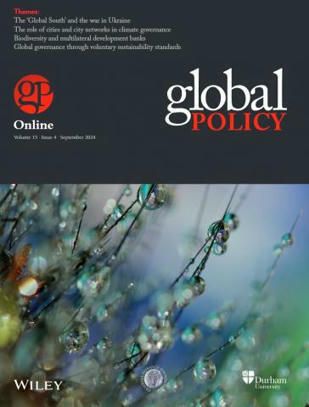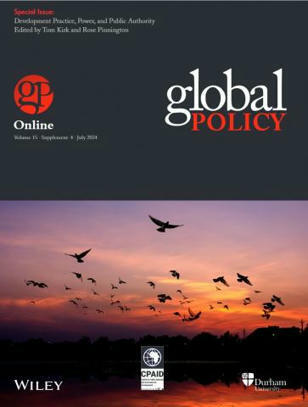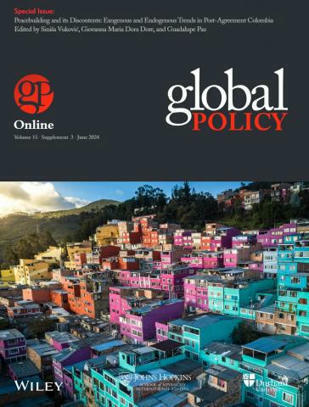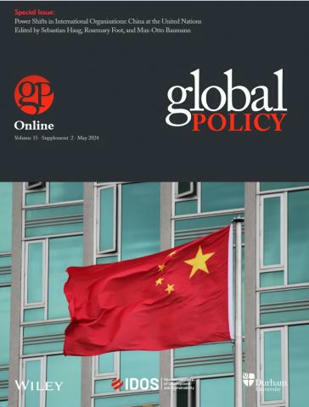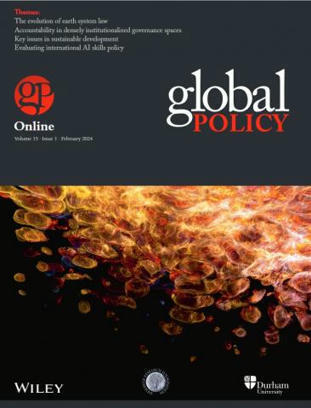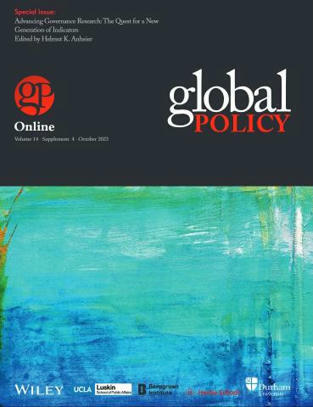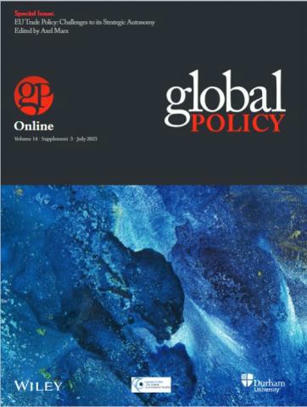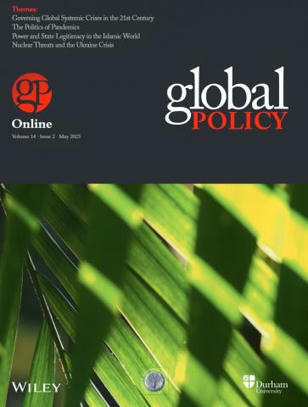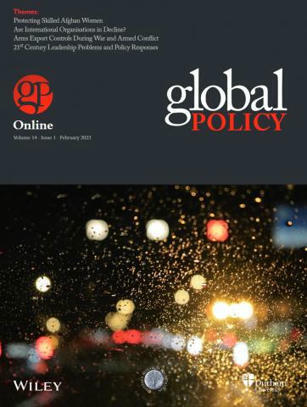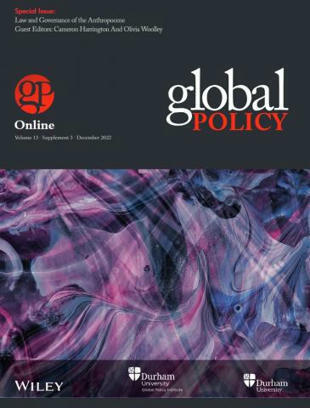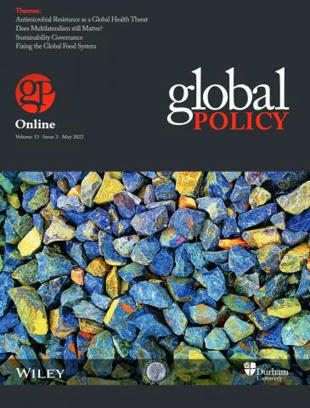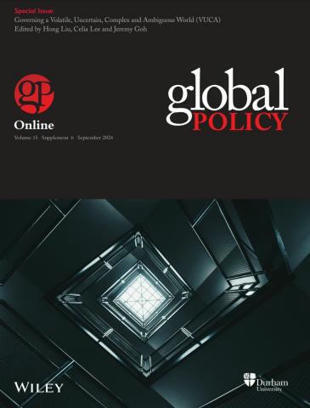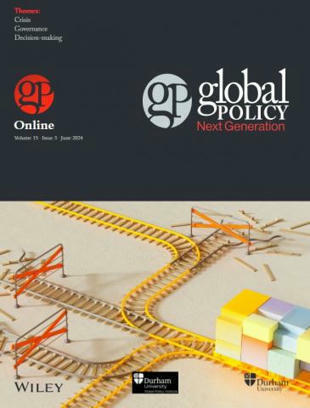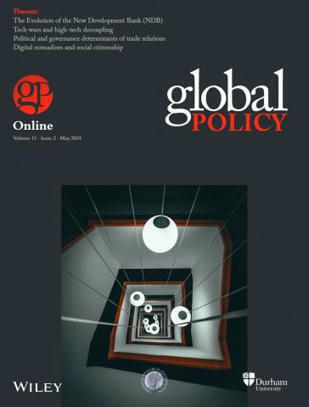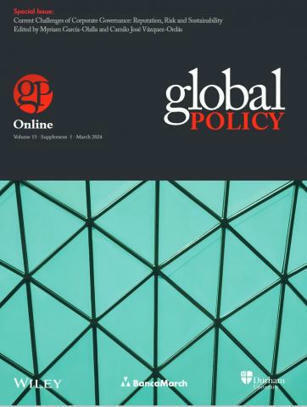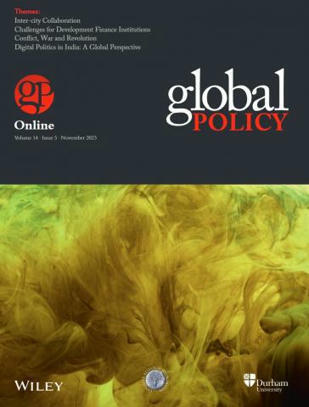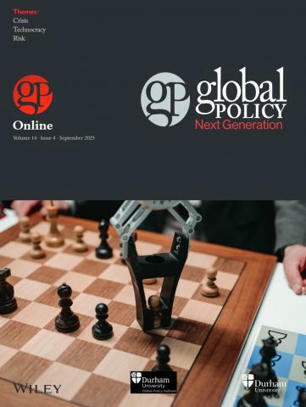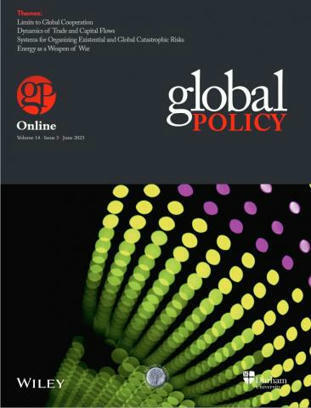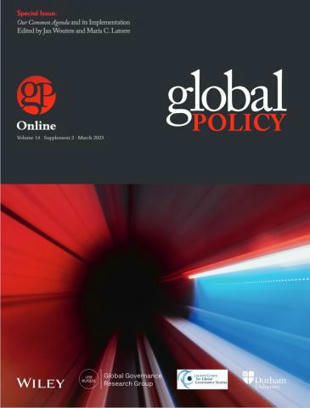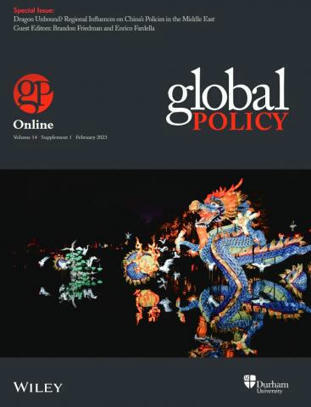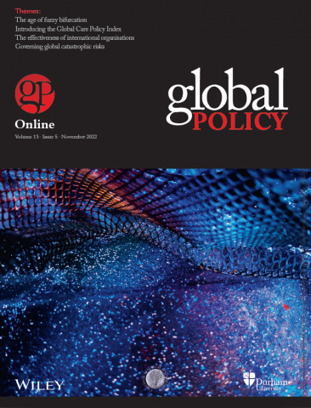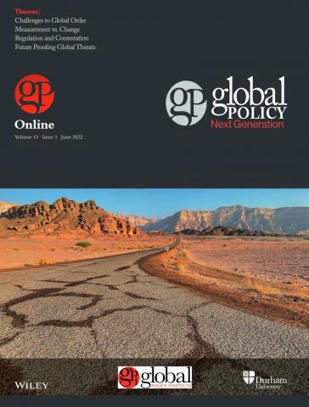 Your new post is loading...
SPECIAL INVESTIGATIVE PROJECT BY BIRN TRACKS ARMS TRADE FROM EUROPE TO THE MIDDLE EAST PUBLISHED ON JULY 28, 2016 An investigation by BIRN and OCCRP has revealed that some of the €1.2 billion in weapons sales from the region has been diverted to Syria and Yemen. Graphic courtesy of BIRN.
Volume 15, Issue 4, September 2024 The September 2024 issue of Global Policy includes a Policy Insights Special Section entitled 'Postliberal Order Making: The ‘Global South’ and the war in Ukraine', edited by Raj Verma and Malte Brosig. There are also, among others, Research Articles on security alliance free-riding, Iran's nuclear deal, urban climate governance, health and free-trade, and global citizens' forums. The issue also includes Policy Insights on the pandemic responses and global voluntary sustainability standards. Research Articles Competing narratives of the Russia–Ukraine war: Why the West hasn't convinced the rest - Hilary Appel An expanded investigation of alliance security free riding - Wukki Kim, Todd Sandler and Hirofumi Shimizu The failed negotiations to restore the Iran nuclear deal - Tom Sauer Small state adaptation and relational autonomy: The case of the United Arab Emirates and South America - Robert Mason and Paulo Cesar Rebello How to constitute global citizens' forums: Key selection principles - John S. Dryzek and Simon J. Niemeyer Behind closed doors: Informal influence on United Nations staffing and pathologies of international bureaucracies - Tianhan Gui The diverse cities of global urban climate governance - Marielle Papin and Jacob Fortier Overcoming gridlock? The role of city networks in transnational cooperation on climate mitigation - Sam Taveirne and Ben Derudder Catching up with climate priorities: Understanding multilateral development banks' evolving approach to biodiversity - Christoph Nedopil, Mathias Larsen, Aurelie Chane-Yook and Divya Narain Assessing public health implications of free trade agreements: The comprehensive and progressive Trans-Pacific Partnership Agreement - Liz Green, Kath Ashton, Leah Silva, Courtney McNamara, Michael Fletcher, Louisa Petchey, Timo Clemens and Margaret Douglas Policy Insights Urgent pandemic messaging of WHO, World Bank, and G20 is inconsistent with their evidence base - David Bell, Garrett Wallace Brown, Jean von Agris and Blagovesta Tacheva Global governance through voluntary sustainability standards: Developments, trends and challenges - Axel Marx and colleagues The geopolitics of supply chains: EU efforts to ensure security of supply - Andrew Glencross Policy Insights Special Section: Postliberal Order Making: The ‘Global South’ and the war in Ukraine Edited by Raj Verma and Malte Brosig The war in Ukraine, the Global South and the evolving global order - Malte Brosig and Raj Verma Argentina and the Ukraine War: Between pragmatism and values - Bruno Binetti Peace as a hypothetical imperative: Brazil's foreign policy standpoint on the war in Ukraine - Dawisson Belém Lopes and Karin Costa Vázquez Aligned or non-aligned: South Africa's response to the war in Ukraine - Malte Brosig Egypt's position in the Russia–Ukraine war - Eman Ragab Russia's invasion of Ukraine: Nigeria's value-driven and pragmatic indifferent stance - Bonnie Ayodele China's reaction to the Russia–Ukraine war: A test case for a global ‘Pax Sinica’? - Björn Alexander Düben Russia–Ukraine war and India's quest for leading power status - Raj Verma Indonesia's Russia-Ukraine war stance and the Global South: Between solidarity and transactionalism - Leonard C. Sebastian and Adhi Priamarizki The benefits of neutrality: Saudi foreign policy in the wake of the Ukraine war - Jens Heibach The Russia–Ukraine war, the evolving global order, the Global South and emergence of non-alignment 2.0 - Raj Verma and Malte Brosig Release Date 30 September 2024
Special Issue - Development Practice, Power and Public Authority Drawing upon research across multiple countries, the articles in this special issue explore how public authority dynamics affect development and humanitarian practice. Some focus on places in crisis, others examine everyday governance in more stable contexts. They are complimented by a conceptual framework for analysing how power permeates the foundations of public authority dynamics. Together they illuminate why exclusions, coercion and violence are often used by those claiming the legitimacy to govern. They argue that well-intended interventions or reform efforts must confront a reluctance to acknowledge public authority dynamics in their official depictions of progress, learnings and impacts. Introduction Development practice, power and public authority - Tom Kirk and Rose Pinnington Research Articles Power and public authority - William D. Ferguson ‘Vaccine populism’ and migrant assistance: On the contingency of mutual aid in Italy's Alpine region - Elizabeth Storer and Costanza Torre Localising aid: Urban displacement, contested public authority and legitimacy in Jordan and Lebanon - Dolf J. H. te Lintelo and Tim Liptrot Local governance networks as public authority: Insights from Mozambique, Myanmar and Pakistan - Anuradha Joshi, Colin Anderson, Katrina Barnes, Egidio Chaimite, Miguel Loureiro and Alex Shankland Intermediaries, isomorphic activism and programming for social accountability in Pakistan - Tom Kirk To go with or against the grain? Politics as practice in the Budget Strengthening Initiative, Uganda - Rose Pinnington Contested ‘commune rurales’: Decentralisation and the (violent) struggle for public authority in the Democratic Republic of Congo - Karen Büscher, Stephanie Perazzone, Jeroen Cuvelier, Stephane Lumbu, Espoir Rwakira, Paul Bulambo, Chrispin Mvano Yabauma and Godefroid Muzalia In the line of duty: Militarising African epidemics - Tim Allen and Melissa Parker Release Date 19 July 2024
Special Issue - Peacebuilding and its Discontents: Exogenous and Endogenous Trends in Post‐Agreement Colombia Release Date 19 June 2024
Special Issue - Power Shifts in International Organisations: China at the United Nations The People’s Republic of China is central to current debates about power shifts in international organisations, but a systematic and comprehensive assessment of China-related shifts has been missing. This Special Issue contributes to addressing this gap and examines whether, how and to what extent China-related power shifts have unfolded at the United Nations (UN) over the last two decades or so. It covers empirical insights from the UN’s three main pillars – peace and security, development, and human rights – and paints an uneven picture. Despite continuing Western dominance, China is mobilising more compulsory power than two decades ago. Chinese attempts to enact institutional power have also increased but mostly unfold in multilateral niches and remain cautious. While China’s structural power position has expanded, China-related effects in productive power have so far remained limited and scattered. Special Issue Introduction Power shifts in international organisations: China at the United Nations - Sebastian Haug, Rosemary Foot and Max-Otto Baumann Special Issue Contributions Reining in a liberal UN: China, power shifts, and the UN's peace and security pillar - Rosemary Foot Accommodation available: China, Western powers and the operation of structural power in the UN Security Council - Richard Gowan ‘Wolf Warriors’ in the UN Security Council? Investigating power shifts through blaming - Nicolas Verbeek From developing country to superpower? China, power shifts and the United Nations development pillar - Max-Otto Baumann, Sebastian Haug and Silke Weinlich Comprehensive power shifts in the making: China's policy transfer partnerships with the United Nations - Sebastian Haug and Laura Trajber Waisbich China, power and the United Nations Special Procedures: Emerging threats to the “crown jewels” of the international human rights system - Rana Siu Inboden Powers of persuasion? China's struggle for human rights discourse power at the UN - Malin Oud Is power shifting? China's evolving engagement with UNESCO - Wenting Meng Chinese power in the World Heritage Committee: From learning the game to shaping the rules - Steven Langendonk and Edith Drieskens A mixed funding pattern: China's exercise of power within the United Nations - Xueying Zhang and Yijia Jing Personnel power shift? Unpacking China's attempts to enter the UN civil service - Shing-hon Lam and Courtney J. Fung Between co-optation and emancipation: Chinese women's NGOs and power shifts at the United Nations - Yiping Cai
Volume 15, Issue 1, February 2024 The February 2024 issue of Global Policy includes a special section on ‘Accountability in densely institutionalized governance spaces' edited by Mette Eilstrup-Sangiovanni and Stephanie C. Hofmann. There are also Research Articles on climate litigation, the MDGs, aid and the Horn of Africa, and ASEAN, among others. The regular Policy Insights section includes pieces on multilateral development banks, peace in Afghanistan and international AI skills policies. Research Articles Courts, climate litigation and the evolution of earth system law - Louis J. Kotzé, Benoit Mayer, Harro van Asselt, Joana Setzer, Frank Biermann, Nicolas Celis, Sam Adelman, Bridget Lewis, Amanda Kennedy, Helen Arling and Birgit Peters Does earmarked funding affect the performance of international organisations? - Bernhard Reinsberg and Christian Siauwijaya Contested informality in regional institutional design: A comparative analysis of ASEAN and the Quad - Andrew F. Cooper and Brendon J. Cannon Qatar's foreign aid and political strategies in the Horn of Africa: The case of Somalia - Altea Pericoli and Federico Donelli Policy and hope: The millennium development goals - Alastair Greig and Mark Turner Unveiling child trafficking: Local perspectives and context in addressing sustainable development goals in Sierra Leone - Alex Balch, Anna M. Cody, David Okech, Tamora Callands, Umaru Fofanah and Haja Ramatulai Wurie Making universal education a priority for sustainable development: The EU, Vietnam and education - Catherine Gegout Policy Insights Special Section Accountability in densely institutionalized governance spaces - Mette Eilstrup-Sangiovanni and Stephanie C. Hofmann Informality and the governance dilemma: How institutional inter-linkages can bridge accountability gaps - Charles B. Roger Ad hoc coalitions: From hierarchical to network accountability in peace operations? - Stephanie C. Hofmann, John Karlsrud and Yf Reykers Global Development Governance 2.0: Fractured accountabilities in a divided governance complex - Sebastian Haug and Jack Taggart Fit for purpose? Just Energy Transition Partnerships and accountability in international climate governance - Joseph Earsom The pursuit of positive accountability in the cyber domain - Patryk Pawlak Policy Insights The future(s) of global governance: A scenarios exercise - Angel Saz-Carranza, Enrique Rueda-Sabater, Marie Vandendriessche, Carlota Moreno and Jacint Jordana Sustainable future bonds: Boosting multilateral development banks lending and improving the global reserve system: Sustainable future bonds - Marina Zucker-Marques and Kevin P. Gallagher Dealing with Europe's economic (in-)security - Federico Steinberg and Guntram Wolff Ecosystem services and sustainable peace in Afghanistan: Gaps in national policy and its security implications - Srinjoy Bose, Maxim Mancino and Dahlia Simangan Evaluating international AI skills policy: A systematic review of AI skills policy in seven countries - Eryn Rigley, Caitlin Bentley, Joshua Krook and Sarvapali D. Ramchurn Release Date 23 February 2024
Special Issue: Advancing Governance Research: The Quest for a New Generation of Indicators Contributors to this special issue examine governance as the interaction among three dimensions: democratic accountability, state capacity and public goods delivery. This Governance Triangle, operationalised by the Berggruen Governance Index, opens the ‘black box’ of governance at the macro level and promises an improved understanding of how and why countries manage to meet the needs of their populations over time. The issue's articles use the Index to point to possible trajectories of specific countries in terms of governance performance and suggest potential policy implications. PART I: Toward a New Understanding of Governance and the Need for a New Generation of Governance Indicators Introducing the Berggruen Governance Index I: Conceptual and methodological framework - Helmut K. Anheier, Markus Lang and Edward L. Knudsen Introducing the Berggruen Governance Index II: Initial results, 2000–2019 - Helmut K. Anheier, Markus Lang and Edward L. Knudsen Introducing the Berggruen Governance Index III. Implications for theory and policy - Helmut K. Anheier and Olga Kononykhina PART II: Country and Regional Reports, Comparative Analysis A falling star? Origins of declining state capacity and democratic accountability in the United States - Edward L. Knudsen Lessons and challenges of China's state-led and party-dominated governance model - Yuqing Yang Debunking the autocratic fallacy? Improving public goods delivery in Russia - Christian Fröhlich Unfinished revolutions: The post-Soviet crisis of governance in Ukraine - Christian Fröhlich Stable or stagnant? Political economy and governance in the United Kingdom, France, Italy and Germany since 2000 - Edward L. Knudsen India: Developmental challenges faced by a dual economy - Yuqing Yang Escape from the ‘lost decades?’ Governance challenges in Argentina, Brazil, Colombia, Mexico, and Venezuela - Edward L. Knudsen Sub-Saharan Africa: Towards better governance and sustainability? - Helmut K. Anheier, Christian Fröhlich and Regina A. List PART III: Advancing Governance Indicator Systems Advancing governance indicator systems: Lessons learned from the 2022 symposium - Helmut K. Anheier, Regina A. List and Edward L. Knudsen Advancing governance indicators: Four ways forward - Helmut K. Anheier Release Date 01 November 2023
Special Issue - EU Trade Policy: Challenges to its Strategic Autonomy Release Date 21 July 2023
Volume 14, Issue 2, May 2023 The May 2023 issue of Global Policy includes research articles on, among others, vaccine politics, European think tanks, the UN General Assembly and governing global crises. There is a special section on power, state legitimacy and counter-narratives in the Arab world. There are also policy insights on Ukraine and digital genetic resources. Research Articles Understanding and governing global systemic crises in the 21st century: A complexity perspective - Didier Wernli, Lucas Böttcher, Flore Vanackere, Yuliya Kaspiarovich, Maria Masood and Nicolas Levrat Vaccine politics: Law and inequality in the pandemic response to COVID-19 - Matthew M. Kavanagh and Renu Singh Politicising pandemics: Evidence from US media coverage of the World Health Organisation - Jeffrey King and Andrew Lugg Public health clauses in international investment agreements: Sword or shield? - Anne Marie Thow, Wolfgang Alschner and Faisal Aljunied How many people in the world do research and development? - Davut Emrah Ayan, Laurel L. Haak and Donna K. Ginther Soft power in global governance: fsQCA of thematic specialization strategies of European think tanks - Vanessa Roger-Monzó and Fernando Castelló-Sirvent Hawks in the making? European public views on nuclear weapons post-Ukraine - Michal Onderco, Michal Smetana and Tom W. Etienne Environmental remediation as social archaeology: Excavating sites contaminated by early nuclear weapons activities in New York City, both literally and hermeneutically - Matthew Breay Bolton and Katherine Ketterer How to assess economic progress in the era of discontinuity? - Marceli Hązła and Ewa Mińska-Struzik Who cares about the UN General Assembly? National delegations size from 1993 to 2016 - Vaclav Vlcek Special Section Discursive challenges: Power, state legitimacy and counter-narratives in the Arab world - Tom Walsh and Betul Dogan-Akkas The Iraqi state's legitimacy deficit: Input, output and identity-based legitimacy challenges - Jacob Eriksson and Isaac Grief The moderation journey of Kurdish Islamism in the Kurdistan region of Iraq - Hardy Hasib Raza Securitisation imperatives and the exaggeration of Iranian involvement with the Houthi movement by international actors - Tom Walsh Policy Insights The Ukraine crisis, the nuclear threat and the ICJ Opinion of 1996 - Peter Hilpold Global governance for digital sequence information on genetic resources: Demand, progress and reforming paths - Geng Qin, Hanzhi Yu and Chao Wu Response Article Law, justice and the role of courts in changing the social superstructure narrative in climate litigation: A Rejoinder to Benoit Mayer - Friederike E. L. Otto, Petra Minnerop, Emmanuel Raju, Luke J. Harrington, Rupert F. Stuart-Smith, Emily Boyd, Rachel James, Richard G. Jones and Kristian C. Lauta
Volume 14, Issue 1, February 2023 The February 2023 issue of Global Policy includes research articles on Afghan women, reframing the climate debate, e-governance, corporate tax governance, and Trump's foreign policy. There is a Policy Insight Special section on arms exports. There are also policy insights on, among others, covid-19 and democracy, Rohingya refugees and a global child protection fund. Research Articles Protecting skilled Afghan women: Brain save and the politics of vulnerability - Kristin Bergtora Sandvik, Ingunn Bjørhaug, Astrid Espegren and Adèle Garnier Are international organisations in decline? An absolute and relative perspective on institutional change - Maria J. Debre and Hylke Dijkstra The organisational dimension of executive authority in the Global South: Insights from the AU and ECOWAS commissions - Jarle Trondal, Thomas Tieku and Stefan Gänzle Reframing the climate debate: The origins and diffusion of net zero pledges - Hermine Van Coppenolle, Mathieu Blondeel and Thijs Van de Graaf Operationalising sustainability? Why sustainability fails as an investment criterion for safeguarding the future - Simon Friederich and Jonathan Symons The Big Four and corporate tax governance: From global dis-harmony to national regulatory incrementalism - Ainsley Elbra, John Mikler and Hannah Murphy-Gregory Digital footprints as barriers to accessing e-government services - Kira Allmann and Roxana Radu All the President's men. Leadership style, advisory system and Donald Trump's mixed record in foreign policy - Andrea Carati and Andrea Locatelli Policy Insights Special Section Introducing the special section on ‘arms export controls during war and armed conflict’ - Anna Stavrianakis Unpacking the storytelling around French arms sales: Demystifying the “strategic autonomy” argument - Emma Soubrier Debunking the myth of the “robust control regime”: UK arms export controls during war and armed conflict - Anna Stavrianakis Demystifying the ‘gold standard’ of arms export controls: US arms exports to conflict zones - Jennifer L. Erickson Policy Insights The 21st century trust and leadership problem: Quoi faire? - Helmut K. Anheier and Edward L. Knudsen COVID-19 and democratic resilience - Richard Youngs Finding synergies and trade-offs when linking biodiversity and climate change through cooperative initiatives - Oscar Widerberg, Idil Boran, Sander Chan, Andrew Deneault, Marcel Kok, Katarzyna Negacz, Philipp Pattberg and Matilda Petersson On a global child protection fund financed by international tech companies - Kemal Veli Açar Major powers make the call? Review of 70 years engagement of major powers with Myanmar - Peng Liu, He Miao and Wang Huan Rohingya refugees in the pandemic: Crisis and policy responses - Mallik Akram Hossain, A. K. M. Ahsan Ullah and Md. Mohiuddin Afghanistan and the way forward: Incorporating indigenous knowledge into policymaking - Zulfia Abawe, Bilquees Daud, Haqmal Daudzai, Moheb Jabarkhail and Farooq Yousaf Response Article The ecosystem of headquarter cities and international organisations needs more consideration - Suyu Liu and Wenjun Ding Corrigendum Correction to “Making It Rain? Comparing the Determinants of Chinese and Western FDI Flows to Africa” Release Date 21 February 2023
Special Issue: Law and Governance of the Anthropocene Release Date 12 December 2022
Vol 13, Issue 4, September 2022 The September 2022 issue of Global Policy includes research articles on, among others, refugee policy, south-south solidarity at the WTO, special economic zones, global shocks and coordinated policy responses, and economic growth in South Asia. There is also a practitioners’ special section on financing green transitions in times of crisis edited by Mariane Søndergaard-Jensen and Andreas Klasen. Research Articles Revisiting the World Order Models Project: A Case for Renewal? - Aaron McKeil Refugee Policy Amidst Global Shocks: Encampment, Resettlement Barriers and the Search for ‘Durable Solutions’ - Samuel J. Spiegel and Johanne Mhlanga Digital Nativity and Digital Diplomacy: Exploring Conceptual Differences Between Digital Natives and Digital Immigrants - Ilan Manor and Ronit Kampf Global shocks and international policy coordination - Ashima Goyal and Rupayan Pal Emerging Powers, Leadership, and South–South Solidarity: The Battle Over Special and Differential Treatment at the WTO - Kristen Hopewell The Intricacies of Firms’ Support for Labor Provisions in US Trade Agreements - Rodrigo Fagundes Cezar What Determines the Heterogeneous Performance of Special Economic Zones? Evidence from Sub‐Sahara Africa - Douglas Zhihua Zeng Globalization and Economic Growth: A Sustainability Analysis for South Asian Countries - Yuanzhi Liu, Akintoye Victor Adejumo, Oluwabunmi Opeyemi Adejumo and Timothy Ayomitunde Aderemi Practitioners’ Special Section Introduction to the practitioners' special section: Financing the green transition in times of crisis - Mariane Søndergaard-Jensen and Andreas Klasen Incorporating sustainability as a cross‐cutting vector in the design of public policies - Xiana Méndez Export credit agencies delivering finance for the green transition in times of crisis - Peder Lundquist Leading an ECA through climate transformation: A President's perspective - Mairead Lavery ECA’s roles to foster green and energy transition in emerging and developing countries - Yuichiro Akita Transiting to green growth in fossil export‐dependent economies: A pathway for Africa - Benedict Oramah Leveraging aid for trade to mobilize climate finance in the least developed countries - Ratnakar Adhikari Managing the green transition: The role of the OECD export credit arrangement - Marion Jansen The role of the global financial system in financing the transition to net zero - Alex Michie Policy Insights Global Governance in an Era of Pluralism - Ian Johnstone and Joshua Lincoln Governing and Measuring Health Security: The Global Push for Pandemic Preparedness Indicators - Alexander E. Kentikelenis and Leonard Seabrooke Crisis and state investment funds with expiration dates: Risks and opportunities in a decarbonization context - Juergen Braunstein Mister Chips goes to Brussels: On the Pros and Cons of a Semiconductor Policy in the EU - Bob Hancké and Angela Garcia Calvo Joint Initiative on Services Domestic Regulation in the WTO: The Case of Russia - Olga Biryukova Presidential diplomacy meets science diplomacy - Diego Lawler and Miguel Fuentes Practitioner Commentary Are the Indicators of the New Urban Agenda Failing Us? - Jari Lyytimäki, Hanna Nieminen, Nufar Finel, Elina Nyberg and Tapio Reinikainen Response Article International Organizations' Policy Response to COVID‐19 in Longer Terms - Suyu Liu Corrigendum Russia, Central Asia and Non‐traditional Security Threats from Afghanistan following the US Withdrawal - Ekaterina Stepanova Release Date 21 September 2022
Vol 13, Issue 2, May 2022 The May 2022 issue of Global Policy includes research articles on, among others, learning lessons from COVID-19, ASEAN and the Arctic Council, asteroid mining and UNSC non-permanent members. There are also practitioners’ commentaries on science diplomacy, China's Zero COVID-19 strategy and the donkey skin trade. The issue is concluded by a review essay on the global food system. Research Articles Antimicrobial Resistance as a Global Health Threat: The Need to Learn Lessons from the COVID-19 Pandemic - Anishka Cameron, Regina Esiovwa, John Connolly, Andrew Hursthouse and Fiona Henriquez Taking Systems Thinking to the Global Level: Using the WHO Building Blocks to Describe and Appraise the Global Health System in Relation to COVID-19 - Josephine Borghi and Garrett W. Brown Does Multilateralism still Matter? ASEAN and the Arctic Council in Comparative Perspective - Mark Beeson and Jolanta Hewitt Sustainable Development Goals and Sustainability Governance: Norms, Implementation Pathways and Caribbean Small Island Developing States - Michelle Scobie Persistence Against the Odds: How Entrepreneurial Agents Helped the UN Joint Inspection Unit to Prevail - Eugénia C. Heldt, Patrick A. Mello, Anna Novoselova and Omar Ramon Serrano Oswald Sharing the Benefits of Asteroid Mining - Eglė Butkevičienė, Florian Rabitz Controlling International Institutions: How the US Engineered UNSC Non-permanent Members in the Early Cold War - Ali Balci Policy Insights The Role of UN Peace Operations in Countering Health Insecurity after COVID-19 - Alexander Gilder The Ambitious Modesty of the High-Level Political Forum on Sustainable Development - Qerim Qerimi Practitioner Commentaries Tripod Missions: Five Principles for Solving Society’s Most Pressing Challenges - David Bach and Henning Meyer Science Diplomacy and COVID-19: Future Perspectives for South–South Cooperation - Jyoti Sharma, Danev Ricardo Pérez Valerino, Claudia Natalie Widmaier, Roberta Lima, Nidhi Gupta and Sanjeev Kumar Varshney Understanding China’s COVID Zero Strategy: The Opening-Up Trilemma - Yuke Li and Ke Meng The Donkey Skin Trade: Challenges and Opportunities for Policy Change - Frances Goodrum, Samuel Theuri, Eva Mutua and Gemma Carder Review Essay Fixing the Global Food System - Tony McGrew
|
Special Issue - Governing a Volatile, Uncertain, Complex and Ambiguous World This special issue aims to contribute to ongoing endeavours to expand practices and theories of governance by bringing in perspectives and case studies from the Global South at a time of great turbulence and uncertainty. It advances discussions pertaining to various aspects of Asian experiences of governance that embraces agility and flexibility in navigating a world that is fraught with volatility, uncertainty, complexity and ambiguity (VUCA). Introduction Agile governance for a volatile, uncertain, complex and ambiguous world - Hong Liu, Celia Lee and Jeremy Goh Research Articles Cutting-edge public space and community-building experiences from a user experience (UX) perspective – A multinational comparison - Fernando Ursine and Yi Xuan Ong The Belt and Road Initiative, outward foreign direct investment and total factor productivity—Evidence from China - Yue Zhang and Fei Ji Policy coordination and development in a VUCA world - Michael Mintrom and Ruby O'Connor Collective leadership for VUCA: From theoretical exploratory study to knowledge creation - Cheng Boon Koh Digital geopolitics in a VUCA world: China encounters a new global order - Hong Liu and Chunzi Miao Policy Insights Road to human-centric smart city governance in Japan: The case of Fujisawa sustainable smart town - Zhijian Wang Singapore's triumph: Governance strategies and societal cohesion during the COVID-19 pandemic - Zainul Abidin Rasheed and Crystal Wen Wen Goh System-quake proof ‘systemic resilience governance’: Six measures for readiness - Geert Bouckaert and Diego Galego Practitioner Commentary Sustainable Environmental, Social and Governance (ESG) development of China and ASEAN in a volatile, uncertain, complex, and ambiguous (VUCA) world - Hak Seng Ang Release Date 10 October 2024
Special Issue - Reflections on the Architecture of Climate Law The articles in this special issue explore the potential for climate law structures that acknowledge the limitations of states to meet their obligations and that more fully integrate scientific evidence. They argue that the aspiration of climate legislation should be achieving positive outcomes, a betterment of the climate conditions for currently disadvantaged and marginalised individuals and communities, and for future generations. And they show why now, more than ever, these prospects must inform scientific research and direct our legal imaginations. The issue is the result of an international conference that was co-convened between the Global Policy Institute (GPI) and the Durham Centre for Sustainable Development Law and Policies (CSDLP). Introduction The possibility of climate restoration law - Petra Minnerop and Friederike E. L. Otto Special Issue Articles Changing climate law and governance: A multi-level perspective - Brian J. Preston Intergenerational Preparedness: Climate Change, Community Interest Obligations and the Environmental Rule of Law - Petra Minnerop Catching the tide: Reversing legal trends to find collective and long-term solutions that value the natural world - Colin T. Reid Synergy-as-principle in global climate regulation - Volker Roeben Equalising the evidence base for adaptation and loss and damages - Friederike E. L. Otto and Frederick Fabian Climate action for health: Inter-regional engagement to share knowledge to guide mitigation and adaptation actions - Robin Fears, Claudia Canales-Holzeis, Deoraj Caussy, Sherilee L. Harper, Victor Chee Wai Hoe, Jeremy N. McNeil, Johanna Mogwitz, Volker ter Meulen and Andy Haines Release Date 18 September 2024
Volume 15, Issue 3, July 2024 Release Date 04 July 2024
Volume 15, Issue 2, June 2024 The June 2024 issue of Global Policy includes a Policy Insights Special Section on ‘The Evolution of the New Development Bank' edited by Gregory T. Chin. There are also Research Articles on intelligence and the 'five eyes', human rights and environmental due diligence laws, liberal environmentalism, China's trade with Africa, and digital nomadism, among others. The regular Policy Insights section includes pieces on in infrastructure in developing economies, US-China high-tech decoupling, the UNFCCC and ‘developing’ country lists. Research Articles Intelligence in international society: An English school perspective on the ‘five eyes’ - Robert Schuett and John Williams The art of the Trump-Iran deal: An unsuccessful coercive foreign policy - Amir Magdy Kamel A comparison of British and German parliamentary discourses on science diplomacy over time- Anna-Lena Rüland and Nicolas Rüffin Supply chain divergence challenges a ‘Brussels effect’ from Europe's human rights and environmental due diligence laws - Mairon G. Bastos Lima and Almut Schilling-Vacaflor Indicator accountability or policy shrinking? Multistakeholder partnerships in reviews of the sustainable development goals - Magdalena Bexell Here to stay? Challenges to liberal environmentalism in regional climate governance - David Krogmann Digital nomadism and the challenge to social citizenship - Adam K. Webb Perceptions of social credit systems in Southeast Asia: An external technology acceptance model - Wiebke Rabe and Genia Kostka Reserving the right to say no? Equilibria around hard trade-sustainability commitments in power-asymmetric contexts - Rodrigo Fagundes Cezar and Oto Murer Küll Montagner Does governance matter? Comparing the determinants of Chinese and Western trade with Africa - David Landry The United States–China ‘tech war’: Decoupling and the case of Huawei - Maria Ryan and Stephen Burman Policy Insights Special Section - The Evolution of the New Development Bank Introduction – The evolution of New Development Bank: A decade plus in the making - Gregory T. Chin The future of the BRICS and the New Development Bank - Jim O'Neill Southern multilateralism from IBSA to NDB: Synergies, continuities and regional options - Chris Alden and Garth le Pere The United Arab Emirates and the New Development Bank: Mutual interests and first-mover advantages - Andrew F. Cooper and Brendon J. Cannon Latin American agency: The New Development Bank, Uruguay's accession and Brazilian influence - Alvaro Mendez Bangladesh and New Development Bank: Accession and after, money and more - Gregory T. Chin and Rifat D. Kamal The New Development Bank in Africa: Mid-term evaluation and lessons learned - Daniel D. Bradlow and Magalie L. Masamba The New Development Bank: Directions on strategic partnerships - Suresh Nanwani Why China supports NDB membership expansion: Going multilateral amid power struggles - Jiejin Zhu New Development Bank's role in the global financial architecture - Bert Hofman and P. S. Srinivas Policy Insights Deciding which ‘developing’ country list to use: A practical guide - Deborah Barros Leal Farias Private sector participation in infrastructure in emerging market and developing economies: Evolution, constraints, and policies - Joseph Mawejje A search dilemma for market niches: Korea and Taiwan in a time of US-China high-tech decoupling - Chan-Yuan Wong and Christopher J. Russell Making the UNFCCC fit for purpose: A research agenda on vested interests and green spiralling - Naghmeh Nasiritousi, Alexandra Buylova, Mathias Fridahl and Gunilla Reischl Release Date 12 June 2024
Special Issue - Current Challenges of Corporate Governance: Reputation, Risk and Sustainability The importance of addressing today's corporate governance challenges, especially those related to reputation, risk, and sustainability, cannot be underestimated. Forward-thinking companies recognize that good governance practices are essential not only to adapt to today's complex business environment but also to ensure a prosperous and sustainable future. This special issue of Global Policy Journal aims to contribute to the debate by analysing the new challenges posed to corporate governance. Introduction to the special issue: “Current challenges of corporate governance: Reputation, risk and sustainability” - Myriam García-Olalla and Camilo José Vázquez-Ordás Research Articles Digital innovation and de-branching in the banking industry: Customer perception and satisfaction - Santiago Carbó-Valverde, Pedro J. Cuadros-Solas, Francisco Rodríguez-Fernández and José Juan Sánchez-Béjar Climate-related credit risk: Rethinking the credit risk framework - Helena Redondo and Elisa Aracil Sustainable banking and trust in the global South - Fernando Ubeda, Alvaro Mendez and Francisco Javier Forcadell Work environment and health of bank employees working from home: Lessons from the COVID-19 pandemic - Carla Azpíroz-Dorronsoro, Beatriz Fernández-Muñiz, José Manuel Montes-Peón and Camilo José Vázquez-Ordás Mapping research on corporate misconduct in banking: Lessons from literature on preventive and punitive actions - Rita Rodríguez-Arrojo, Manuel Luna, Camilo J. Vázquez-Ordás and Myriam García-Olalla Risk analysis of Spanish companies - Juan Antonio Rodríguez-Sanz, Eleuterio Vallelado and Miguel Fernández-Martín How the method for delivering loans impacts on the economic efficiency of microfinance institutions - José L. Fernández Sánchez, María D. Odriozola and Elisa Baraibar-Diez Release Date 25 March 2024
Volume 14, Issue 5, November 2023 The November 2023 issue of Global Policy includes two special sections: one on ‘Conflict, War and Revolution’ edited by Bettina Koch and Eva-Maria Nag; and a second on ‘Digital Politics in India: A Global Perspective’ edited by Jean-Thomas Martelli, Aasim Khan and Ralph Schroeder. There are also Policy Insight articles on, among others, the World Economic Forum, disinformation, civic ecosystems and science diplomacy. There is a practitioner’s commentary on the OECD’s arrangement on export credits. Research Articles Fifty years of peril: A comprehensive comparison of the impact of terrorism and disasters linked to natural hazards (1970–2019) - Timothy Wilson and Ilan Noy Inter-city collaboration: Why and how cities work, learn and advocate together - Katharine A. Robb, Michelle LaPointe, Kathryn Hemsing, Grant Anderson, James Anderson and Jorrit de Jong Sweden's image in the world: Still a ‘model’? - Ralph Schroeder Fair and inclusive markets: Why dynamism matters - Reda Cherif, Fuad Hasanov and Philippe Aghion Labour provisions in trade agreements and women's rights in the global south - Ida Bastiaens, Evgeny Postnikov and Anne-Kathrin Kreft Net zero portfolio targets for development finance institutions: Challenges and solutions - Sam Fankhauser, Sugandha Srivastav, Ingrid Sundvor, Stephanie Hirmer and Gireesh Shrimali Rhetorical coercion, institutional legitimacy and the creation of the Asian Infrastructure Investment Bank - Hai Yang SPECIAL SECTION I - Conflict, War and Revolution - Edited by Bettina Koch and Eva-Maria Nag Debating conflict, war and revolution: Introduction to the special section - Bettina Koch and Eva-Maria Nag War in World Society: Towards a new order of global constitutionalism? - Hauke Brunkhorst Give peace a chance … for what? Paine, Kant and democratic peace - Garion Frankel and Cary J. Nederman Pacification as a key problem of politics in international political thought - Desirée Poets Technology as a paradigm to investigate war - Xi Lin Why conflict, war and revolution? - Paul Kelly Policy Insights The World Economic Forum: An unaccountable force in global health governance? - Desmond McNeill Health systems appraisal of the response to antimicrobial resistance in low- and middle-income countries in relation to COVID-19: Application of the WHO building blocks - Jay Patel, Genevie Fernandes, Ambele Judith Mwamelo and Devi Sridhar Civic ecosystems and social innovation: From collaboration to complementarity - Iavor Rangelov and Marika Theros Lessons from outperformance in the Indian financial sector - Ashima Goyal China's 5G and supercomputing industrial policies: A critical (comparative) analysis - Yuhan Zhang Techno-nationalism or building a global science and technology commons? (but what about China?) - Leonard Lynn and Hal Salzman New architectures for bottom-up science diplomacy: Learning from the evolving Portuguese diaspora in the UK - Luís Miguel Lacerda, Manuel Heitor and Jean-Christophe Mauduit Hybrid warfare and disinformation: A Ukraine war perspective - Sascha-Dominik Dov Bachmann, Dries Putter and Guy Duczynski Inequalities and content moderation - Giovanni De Gregorio and Nicole Stremlau SPECIAL SECTION II - Digital Politics in India: A Global Perspective - Edited by Jean-Thomas Martelli, Aasim Khan and Ralph Schroeder The sound, the fury and the silences: The politics of influence in digitalizing India - Jean-Thomas Martelli, Aasim Khan and Ralph Schroeder Decoding the star system: Twitter and its impact on journalism in the global South - Aasim Khan, Midhat Fatimah, Kabir Dureja and Vedant Jumle Populism à la Carte: The paradoxical political communication of Narendra Modi on Twitter - Jean-Thomas Martelli and Vihang Jumle Influencers as institutions: Impact of digital politics in the Global South - Karishma Sinha, Paarmita Jhalani, Aasim Khan and Payel Chattopadhyay Mukherjee Sporting the government: Sportspersons' engagement with causes in India and the USA on twitter - Dibyendu Mishra, Ronojoy Sen and Joyojeet Pal Institutional isomorphism in corporate Twitter discourse on citizenship and immigration in India and the United States - Shehla Rashid Shora, Arshia Arya and Joyojeet Pal The Aadhaar battle: Why some players in the corporate world needed a biometric ID? - Nicolas Belorgey Practitioner Commentary The new OECD arrangement on export credits: Breakthrough or bad compromise? - Andreas Klasen and Jan Vassard Release Date 28 November 2023
Volume 14, Issue 4, September 2023 Release Date 25 September 2023
Volume 14, Issue 3, June 2023 The June 2023 issue of Global Policy includes research articles on, among others, just energy transitions, the SDGs, existential and global catastrophic risks, atomic bomb damage, Ukraine and legal grey zones, and energy as a weapon of war. There are also practitioner commentaries on telecommunication and digitalisation, and global value chains, and policy insights on negotiations for a pandemic treaty and data solidarity. Research Articles Mind the gap: The global governance of just transitions - Peter Newell, Freddie Daley, Olga Mikheeva and Iva Peša Missing the SDGs: Political accountability for insufficient environmental action - Lena Partzsch Strongman leadership and the limits to international cooperation - Richard Higgott and Taelyn Reid Financial globalisation in ASEAN+3: Navigating the financial trilemma - Sasidaran Gopalan, Bhavya Gupta and Ramkishen S. Rajan Foreign direct investments and the dynamics of trade and capital flows: Schumpeterian insights for sustained development - Patrick Kaczmarczyk and Heiner Flassbeck Taking stock of systems for organizing existential and global catastrophic risks: Implications for policy - Gabel Taggart Addressing the atomic bomb damage: Associations between ‘state compensation’ demands and aspects of survivors' suffering - Vladisaya Bilyanova Vasileva, Shizue Izumi and Noriyuki Kawano Rescaling the legal dimensions of grey zones: Evidence from Ukraine - Borys Kormych, Tetyana Malyarenko and Cindy Wittke Energy as a weapon of war: Lessons from 50 years of energy interdependence - Michael Carnegie LaBelle Policy Insights The policy response to global value chain disruption - Uri Dadush Who drives the international standardisation of telecommunication and digitalisation? Introducing a new data set - Sebastian Klotz Practitioner Commentaries Against data individualism: Why a pandemic accord needs to commit to data solidarity - Ilona Kickbusch and Barbara Prainsack International negotiations for a pandemic treaty: A thematic evaluation of 43 member states - Jay Patel Can global trade rules cope with changing nutrition challenges? - Anne Marie Thow, Erik Wijkström and Christiane Wolff Release Date 26 June 2023
Special Issue: Our Common Agenda and its Implementation Release Date 21 March 2023
Special Issue: Dragon Unbound? Regional Influences on China's Policies in the Middle East Release Date 13 February 2023
Vol 13, Issue 5, November 2022 The November 2022 issue of Global Policy includes research articles on, among others, the pandemic and Ukraine, stewardship of the SDGs, financing green transitions, austerity policies, and nuclear war. There are also three policy insights on governing global risks, monitoring ceasefires and an increasingly multipolar world. Research Articles The age of fuzzy bifurcation: Lessons from the pandemic and the Ukraine War - Richard Higgott and Simon Reich If caring begins at home, who cares for the carers? Introducing the Global Care Policy Index - Anju Mary Paul, Jiang Haolie and Cynthia Chen Making global public policy work: A survey of international organization effectiveness - David Coen, Julia Kreienkamp, Alexandros Tokhi and Tom Pegram International organisations as ‘custodians’ of the sustainable development goals? Fragmentation and coordination in sustainability governance - Melanie van Driel, Frank Biermann, Rakhyun E. Kim and Marjanneke J. Vijge The UN High‐Level Political Forum on Sustainable Development: An orchestrator, more or less? - Marianne Beisheim and Felicitas Fritzsche A comparative analysis of the environmental and social policies of the AIIB and World Bank - Laerte Apolinário Júnior and Felipe Jukemura Export finance and the green transition - Andreas Klasen, Roseline Wanjiru, Jenni Henderson and Josh Phillips A contemporary social contract: An exploration of enabling factors influencing climate policy intractability in developed nations - Stephen P. Groff Causality and the fate of climate litigation: The role of the social superstructure narrative - Friederike E. L. Otto, Petra Minnerop, Emmanuel Raju, Luke J. Harrington, Rupert F. Stuart-Smith, Emily Boyd, Rachel James, Richard Jones and Kristian C. Lauta Back to the Future: Lessons from the 2009–2012 austerity policies for the aftermath of the COVID crisis - Alfredo Arahuetes García and Gonzalo Gómez Bengoechea The results of internal devaluation policy as a crisis exit strategy: The case of Spain - Javier Bilbao-Ubillos and Ana-Isabel Fernández-Sainz Nuclear war as a predictable surprise - Matthew Rendall Policy Insights A Safe Governance Space for Humanity: Necessary Conditions for the Governance of Global Catastrophic Risks - Len Fisher and Anders Sandberg Ceasefire monitoring under fire: The OSCE, technology, and the 2022 war in Ukraine - Aly Verjee A future multipolar world - Michael Lloyd and Chris Dixon Response Articles Iran's Taliban problem revisited - Fred H. Lawson and Matteo Legrenzi Attribution science and the fate of climate litigation - Benoit Mayer Erratum Correction to Driving Global Convergence in Green Financial Policies: China as Policy Pioneer and the EU as Standard Setter Release Date 24 November 2022
Vol 13, Issue 3, July 2022 Release Date 12 July 2022
|



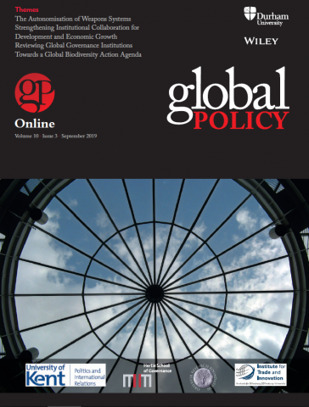


 Your new post is loading...
Your new post is loading...
